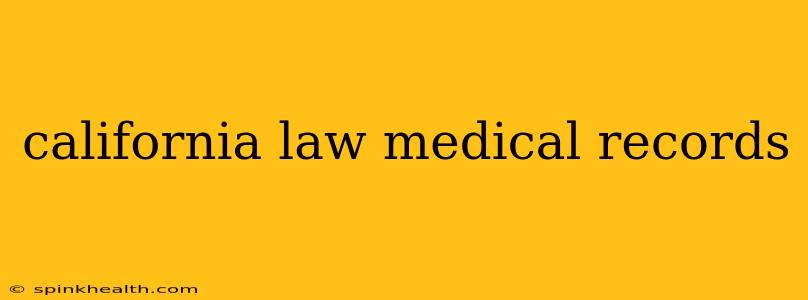California, known for its progressive stance on many issues, also holds a strong position regarding individual rights to access and control personal medical information. This isn't just about paperwork; it's about empowering you to understand and manage your healthcare journey. Let's unravel the complexities of California law surrounding medical records.
What are my rights regarding access to my California medical records?
This is the cornerstone of the issue. Imagine this: you're trying to understand a chronic condition, need to share your health history with a new doctor, or perhaps are considering a medical malpractice claim. Accessing your medical records is crucial. California law, under the Confidentiality of Medical Information Act (CMIA), gives you, the patient, broad rights to access your own medical records. This isn't a privilege; it's a legal right. You can request your records from the healthcare provider, and they are legally obligated to comply within a reasonable timeframe (usually 5-10 business days). This includes not only your diagnoses and treatment plans but also lab results, billing information, and notes from your healthcare providers.
How do I request my medical records in California?
The process is typically straightforward. Most healthcare providers have a standard request form, often available on their website or obtainable by phone call. It's a good idea to put your request in writing to establish a clear record of your request. Be specific about the records you need; the more detail you provide, the easier it will be for the provider to fulfill your request. Remember, you have the right to receive copies of your records in a reasonable format – be it paper or electronic. If you have difficulty accessing your records, don't hesitate to contact the provider directly to inquire about any delays or challenges. The California Medical Board offers resources and handles complaints about providers who do not comply with record access laws.
What if my California medical records contain errors?
Finding errors in your medical records can be alarming, but California law provides a path to correct inaccuracies. You have the right to request an amendment or correction to your records if you believe they contain errors or omissions. The healthcare provider will then investigate your request. They are not required to make the changes you request, but they are required to make a decision and inform you of their decision and the reasoning behind it. If they decline your amendment request, you may include a statement explaining your position with your medical record.
Are there any fees associated with obtaining my medical records in California?
Yes, there is usually a small fee, often covering the cost of copying and processing your records. However, this fee cannot be excessively high and must be reasonable. The provider is legally obligated to inform you about their fees upfront. If you're facing financial hardship, you might be able to negotiate a payment plan or seek assistance from patient advocacy groups.
Can my California medical records be released to someone else without my consent?
Generally, no. California law strongly protects the confidentiality of your medical information. Your healthcare provider cannot release your records to anyone else without your written authorization, except under specific limited circumstances such as reporting required by law (like suspected child abuse or certain communicable diseases). This highlights the importance of carefully reviewing any release-of-information forms before signing them.
What if I'm denied access to my California medical records?
If you've been denied access to your medical records despite a legitimate request, you have avenues to pursue. You can file a complaint with the California Medical Board or seek legal counsel. The law is on your side, and there are mechanisms for redress if your rights are violated. Remember, consistent and persistent communication is key.
This is not exhaustive legal advice, and the specifics can vary based on the nature of your medical care and the specific provider. It's always best to consult with a legal professional if you face significant challenges accessing or correcting your medical records. Understanding your rights is the first step towards actively participating in your healthcare.

